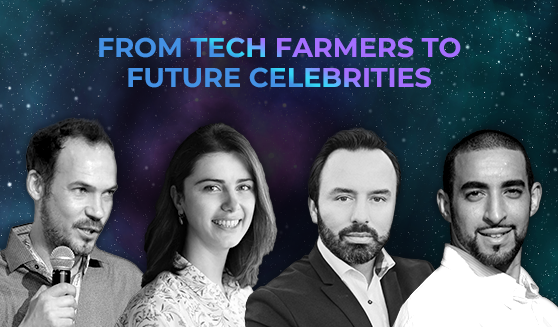
When you hear about AI-powered systems that create and maintain stable plant-growing environments, or robotics and automated data collection that enables the creation of sustainable insect protein, you’d be forgiven for thinking that the organisations doing those things are tech companies.
At #LEAP22, however, Sky Kurtz (Co-Founder and CEO at Pure Harvest Smart Farms) offered a different way of looking at the work of businesses like these – and at his own business, which uses smart tech to grow Mediterranean vegetables in the Arabian desert. According to Kurtz, he doesn’t run a tech company – because the business doesn’t sell tech to make money. Instead, “we characterise ourselves as ‘technology-enabled,’” he said – and sees Pure Harvest as an energy company.
We’re going to take that a step further. Instead of tech companies, you could call all the businesses we mentioned above ‘tech farmers’. Or perhaps even just…farmers.
Which makes perfect sense if you acknowledge the fact that technology has always been used in agriculture. A farm that used the first petrol powered tractors in the late 1880s, or deployed early industrial irrigation systems to water crops, wouldn’t have called itself a tech company. Those farms were simply using and adapting the technology available at the time to grow food as efficiently as possible; and that’s exactly what today’s tech-enabled farms are doing too.
Kurtz’s comments came in the middle of a conversation with three other tech farming CEOs: Derya Baran (Co-Founder, CEO and Chief Engineer at Red Sea Farms), Mohammed Ashour (Founder and CEO at Aspire), and Marcio Barradas (CEO at Moodbytes). They were talking about how we can use technology to end world hunger – and one unexpected insight from that conversation was that farmers themselves will take on a whole new place in society.
Tech is essential to enable sustainable, local food production
According to Baran, we can’t look at food production in isolation from other aspects of sustainability. As per the zeroth law of thermodynamics, “if a system is equal with A and B, and B and C, that means A and C are equal too. It sounds so simple, but I don’t think food tech is a problem on its own — food, energy, and water is a nexus that needs to be broken.”
This becomes clear when you look at food production challenges from a local perspective. In Saudi Arabia for example, sun energy exists in abundance – and schemes like the Sakaka Solar Power Plant take advantage of that, with 1.2 million solar panels situated on 6km² of land. Water, however, is not in abundance, which is why innovation in water conservation, filtering, and recycling is essential to enable food production.
Farming technology in Saudi Arabia, then, needs to be very different from farming technology in a country like Colombia, for example, which has the highest precipitation rate in the world – with an estimated 3,240 millimetres of rain per year and permanent flooding in some areas.
For Ashour, the two key issues that have to be addressed in order to reduce (and ideally end) world hunger are food security and food sovereignty. The first is about ensuring access to safe, affordable, and nutritious food for all populations, and the second is about liberating populations so they can produce their own food. Both of these issues have to take into account local environmental and social factors – and they can only work if sustainable food production happens in conjunction with sustainable energy and water security.
At Aspire, Ashour and his team have been focusing on developing a sustainable protein source. And their research guided them towards insects: “Unlike a cow which needs about 8kg of feed to produce 1kg of meat, with insects that conversion is 1.2 to 1. So you’re using a fraction of the amount of land, water, and resources.”
“Some people are hungry,” Baran noted, “but some people are more hungry. If you look geographically, one third of the people live in the equatorial region, and they will not go anywhere; they will keep living there. So we need to come up with technologies that are local and customised. There’s no one silver bullet technology that will end world hunger.”
What does this mean for farmers?
Farmers don’t have a reputation for celebrity acclaim – but Barradas thinks that technology, and efforts to increase tech acceptance in agriculture and food production, will change this.
“The same way that chefs became very trendy, and like rockstars,” he said, “I think the next change in this industry is that the farmer is going to follow the same route. I can start to imagine reality shows that show how the farmer uses technology to monitor all his crops; how he can deploy his tractors from home; how he can have his drones analysing where the bugs are coming and what sort of infections he has. And that will make a big gap between the last generation of farmers, and the new one coming.”
Farming will be less about toiling with soil and animals, and more about innovation and data. In the process of educating the public about modern food production systems, farmers could well step into a new place in society – acting as ambassadors for tech as well as doing the work to develop sustainable food sources.
Ashour added, “there’s this conception that there’s a fear to embrace technology in food production. But the reality is technology has always been used in every era.”
Technology could accelerate agricultural productivity exponentially. It could enable sustainable food sources that we can’t currently conceive of in our minds: “and rather than fear it or see it as something that is threatening, we have to embrace it,” Ashour said.
But entrepreneurs – tech innovators and tech farmers – have to prove that the technology really works; “because unlike in other sectors, in agriculture you don’t move fast and break things — because this is food, and this is people’s livelihood.”








